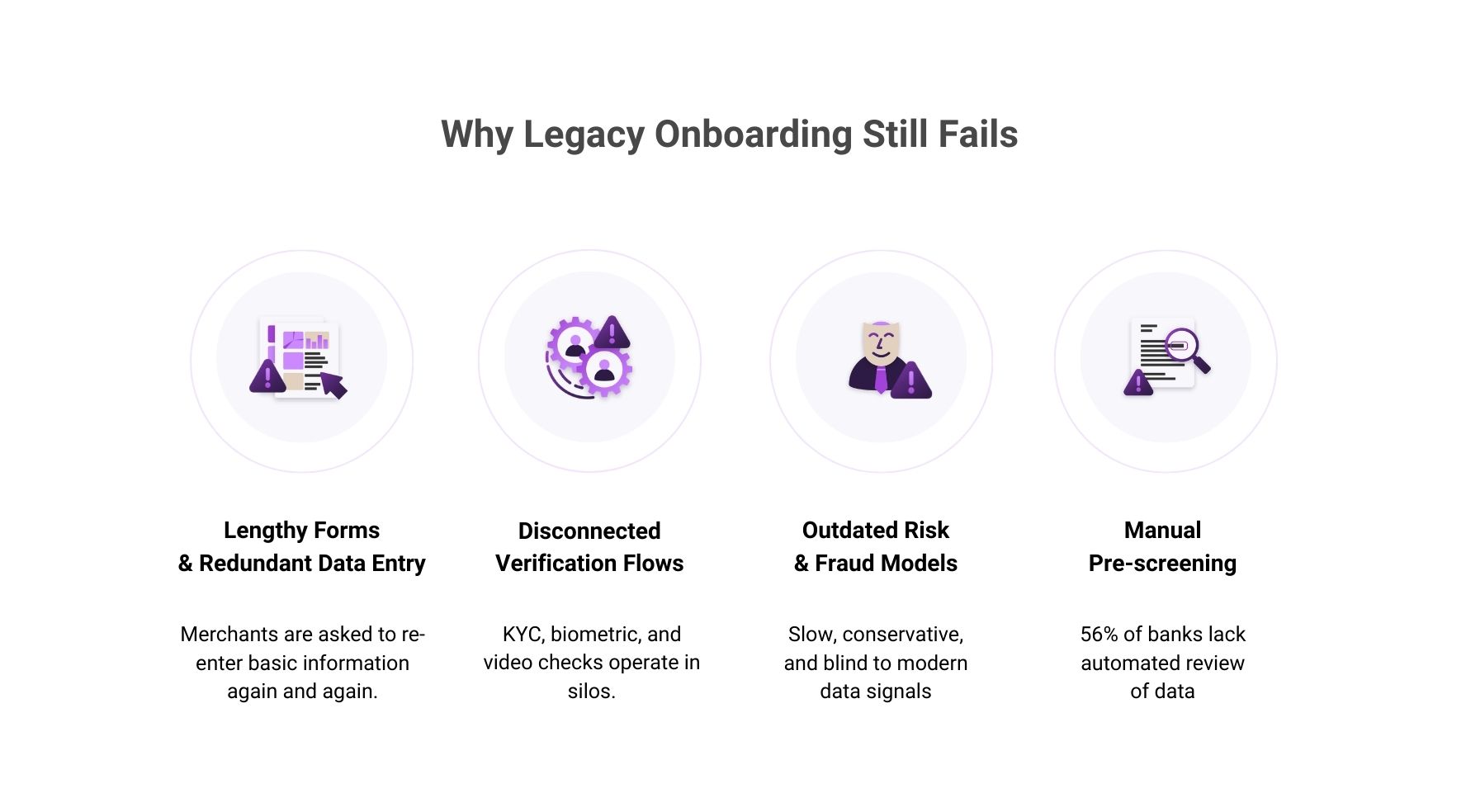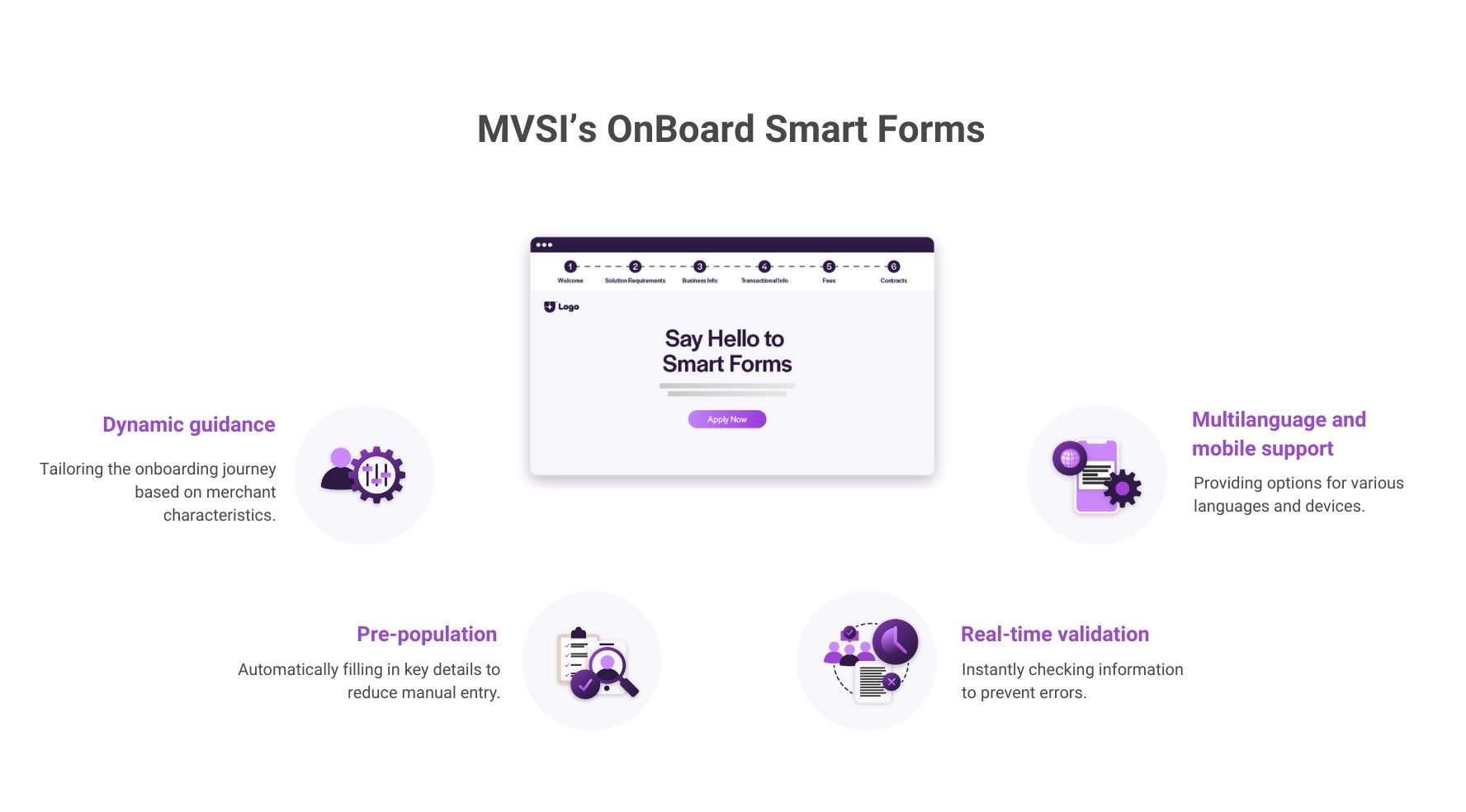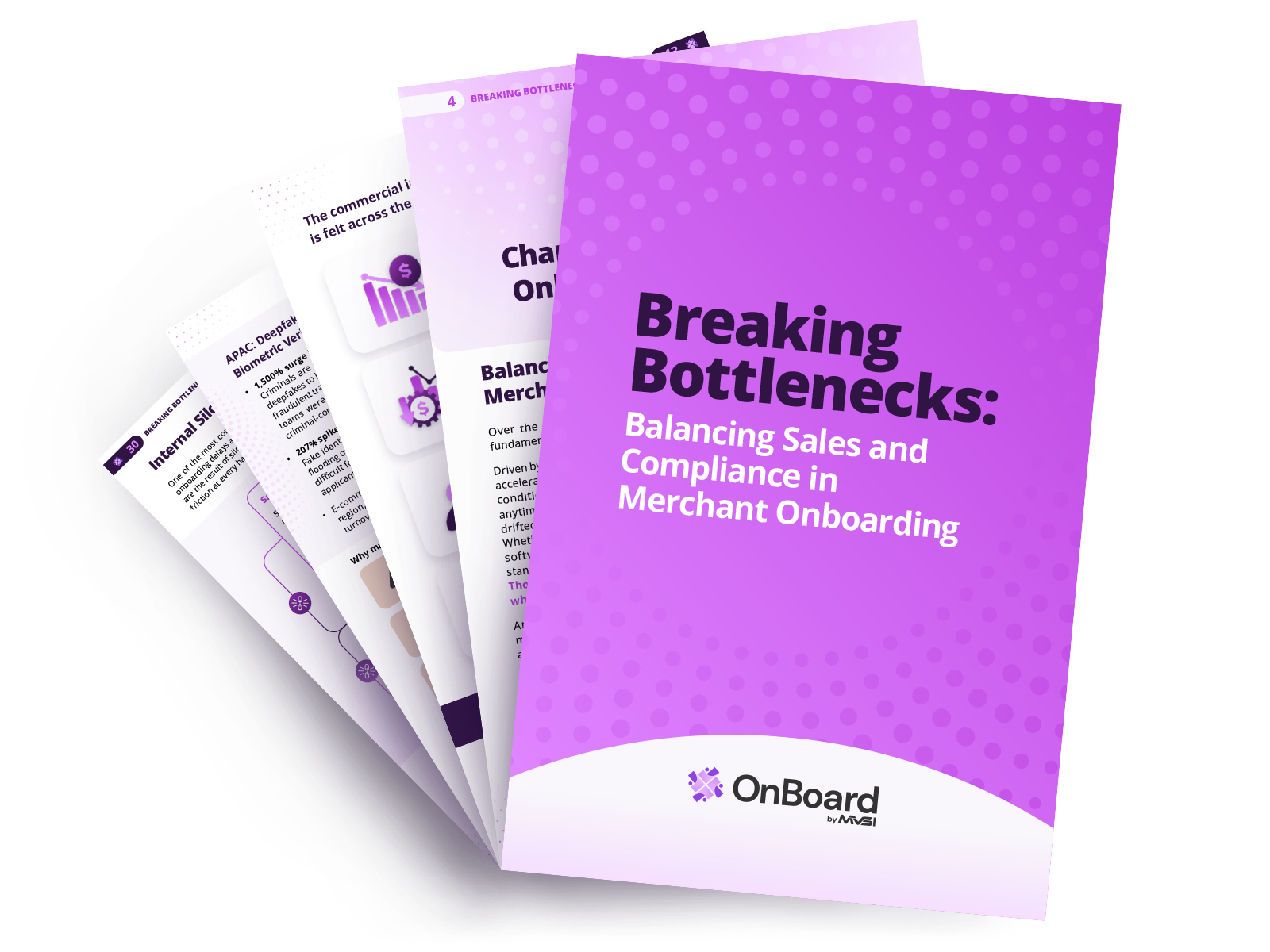Most merchant onboarding journeys break before they even reach underwriting. What should open doors to growth instead becomes a wall of friction. Outdated forms, manual reviews, and confusing compliance steps that drive merchants to faster competitors. For PSP's sand acquirers, every abandoned application is more than lost revenue. It’s a customer relationship handed to a competitor. Digital-first PayTechs can now approve merchants in the time it takes to drink a coffee, setting instant onboarding as the new standard. Traditional acquirers, by contrast, can still take up to seven days to complete the same process—a delay that, in 2025, is more than a mere inconvenience. It represents a direct revenue leak and a stark reminder that legacy processes struggle to meet today’s expectations.
MVSI built OnBoard to solve this gap once and for all, a unified digital onboarding platform that combines dynamic Smart Forms, real-time risk scoring, and automated underwriting in a single digital ecosystem. This article explores why friction persists, how modern automation removes it, and why merchant experience—not paperwork—is now the ultimate competitive advantage.
Key Takeaways
- Smart Forms are the catalyst for seamless merchant onboarding, turning complex merchant applications into fast, guided digital onboarding experiences.
- Clean, verified data captured through Smart Forms powers the credit risk engine and automated underwriting for faster, safer decisions.
- Automation creates a management-by-exception model, where low-risk merchants are instantly approved and teams focus only on anomalies.
- Continuous compliance automation strengthens payments risk management, builds merchant trust, and prevents merchant attrition.
- MVSI’s OnBoard ecosystem unites Smart Forms, real-time risk engines, and automated underwriting into one digital onboarding platform that drives faster, safer, and more compliant merchant onboarding.
When Merchant Onboarding Becomes a Bottleneck
When a merchant chooses a PSP or acquirer, patience is short. Each extra field, upload, or unexplained compliance step drains goodwill and momentum, pushing them toward abandonment. The numbers prove the pain. Forty percent of small and mid-sized merchants plan to leave banks for PayTechs within a year, according to Capgemini’s 2026 World Payments Report. Onboarding costs banks about $496 USD per merchant, more than double the digital-first average of $214 USD. Slow, manual processes don’t just slow growth. They drain revenue, fuel attrition, and erode competitiveness. Once merchants experience a frictionless journey, they rarely go back.
Why Legacy Onboarding Still Fails and What That Costs You
Merchant onboarding is still one of the least automated functions in financial services, with many PSPs and acquirers juggling disconnected systems, spreadsheets, and manual checks. The symptoms are clear and costly:
- Lengthy forms and redundant data entry: merchants are asked tore-enter basic information again and again.
- Disconnected verification flows: biometric, video, and KYC systems that don’t talk to each other, forcing manual reconciliation.
- Outdated risk and fraud models: 65% of banks still rely on legacy credit-risk and fraud detection tools that are slow, conservative, and blind to modern data signals.
- Manual pre-screening: 56% of banks lack any automated review using public, business or financial data.

The result is predictable: merchant fatigue, data errors, and abandonment before underwriting even starts.
Since the pandemic, payments moved quickly to digitized, interconnected systems that deliver speed and efficiency at scale. Merchants now expect the same transformation in onboarding. If payments can be processed instantly, the merchant onboarding process should not take days. Digital onboarding is the benchmark, and instant onboarding is now the expectation in a digital-first market.
In short, legacy onboarding breaks in three ways: too slow to win over merchants, too expensive to scale, and too manual to manage risk at modern transaction volumes.
Fatigue, Friction, and the Hidden Cost of Abandonment in Merchant Onboarding
Onboarding isn’t a back-office process, it’s the first impression that defines the entire relationship. In a digital-first world, merchant experience has become the new measure of competitiveness. Merchants expect onboarding to feel as smooth as the ecommerce platforms they already use. When the process is slow or confusing, they don’t complain, they simply move on to a provider that makes it easier.
Fatigue and friction are silent killers in merchant onboarding. Every extra form field feels like wasted time. Every manual document upload creates doubt. Every compliance delay erodes trust. Merchants do not see these steps as necessary checks, they see them as poor customer experience.
Research confirms the frustration is real. According to the 2025 Merchant Services CX Report by OvationCXM, only 24% of businesses described merchant services onboarding as very easy, and just 53% were satisfied with their experience. Information gaps topped the list of pain points, with 18% citing confusing instructions and 12% pointing to difficulty accessing needed information. Each gap translates directly into fatigue and abandonment. When merchants encounter unclear steps or delays, they lose patience and complete their application with another provider, turning friction into lost revenue.
The consequences are significant. Abandonment does not just mean one lost application. It fuels merchant attrition, weakens growth, and causes direct revenue loss. Once a merchant finds a PSP or acquirer offering faster onboarding, they rarely return to the slower provider. Outdated onboarding is not only inefficient, it actively pushes merchants into the hands of competitors.
This is why automation, speed, and intelligence are no longer optional. They’re the baseline. Providers that deliver instant, friction-free onboarding earn loyalty and scale profitably. Those that don’t, are left behind in a market where every click counts.
The Modern Standard for Merchant Onboarding: Connected, Automated, Intelligent
Today’s leaders in merchant services operate a unified onboarding ecosystem, not a chain of disconnected tools. It begins with Smart Forms that guide merchants dynamically, pre-filling data from trusted sources. AI-led data extraction and interpretation now enhance this step, pulling key information from documents, websites, and unstructured data to verify details instantly. The process continues with real-time risk scoring, live credit checks, and automated underwriting. Together, these elements create the foundation for true no-touch onboarding—intelligent, compliant, and fast.
This model transforms merchant onboarding from a slow, linear workflow into a live digital ecosystem. It removes friction and builds intelligence and trust directly into the process.
As Rajesh Saxena noted in The Fifth Wave, traditional SME onboarding can take more than ten days and require up to twenty documents moving through back offices. Cloud-native, API-driven platforms now reduce that to approval in principle within an hour, with no physical paperwork.
For PSPs and acquirers, this isn’t about incremental improvement, it’s a structural advantage. Automation cuts acquisition costs, reduces operational strain, and brings merchants live faster, accelerating revenue recognition.
Smart Forms: The Catalyst for Seamless Merchant Onboarding
MVSI’s OnBoard Smart Forms are designed around a simple principle: every field must earn its place. The era of static, one-size-fits-all application forms is over. Smart Forms are more than digital paperwork; they are the engine that powers every downstream automation. Each field is purposeful, verified, and connected. Instead of static templates, Smart Forms adapt in real time to merchant type, geography, and risk category, guiding users through only what is relevant. The result is clean, validated data captured once and used everywhere across the merchant onboarding journey, from credit checks to underwriting and compliance.
Smart Forms remove early friction by turning a once painful process into a guided, dynamic experience that keeps merchants moving forward.
Dynamic guidance
Instead of forcing every merchant through the same lengthy application, Smart Forms customize the merchant onboarding journey in real time. They adapt based on business type, location, and risk category, showing only the questions that are truly relevant. This keeps merchants focused, reduces confusion, and shows their time is valued. The result is higher completion rates and cleaner, more useful data captured from the start.
Pre-population
Using verified business databases, APIs, and trusted public sources, Smart Forms automatically fill key details such as company name, address, and registration data. This removes repetitive entry and reduces human error. Merchants move faster with greater confidence, while acquirers benefit from quicker screening, fewer duplicates, and data that meets compliance standards.
Real-time validation
Even small mistakes can create big delays in merchant onboarding. Smart Forms check information as it is entered, flagging missing fields or inconsistencies instantly. Merchants can fix issues on the spot, avoiding long email loops. This speeds onboarding and reduces pressure on operations teams.
Multilanguage and mobile support
Not every merchant applies in English or from a desktop device. Smart Forms are fully mobile friendly and support multiple languages, allowing merchants to complete applications on any device in their preferred language. This broadens reach, reduces avoidable drop-offs, and improves satisfaction for both merchants and payment providers.
Each of these capabilities reduces effort, builds confidence, and turns the first interaction into momentum instead of fatigue.

But their value extends far beyond user experience. Smart Forms are the first and most strategic data capture point in the entire onboarding ecosystem. The clean, structured, and validated data they collect becomes the single source of truth that drives intelligent analysis, powers the Risk Engine’s scoring, and streamlines compliance through automated due diligence. Because every field is accurate and every record complete from the start, the entire process can operate on a management-by-exception model—fast, confident, and compliant from the first touch.
According to The Banking Journal, digital onboarding can reduce the average cost per client to as low as $120, compared with much higher manual processing costs. That is true efficiency at scale.
But the real transformation comes from what Smart Forms enable. They’re not the start of the process, they’re the spark that powers it. Every accurate data point captured here becomes the foundation for the entire onboarding journey. It fuels the Risk Engine’s real-time scoring, triggers automated underwriting, and informs compliance through ongoing due diligence. With one clean source of truth accessible to every stakeholder, from sales to compliance, payment providers can move from reactive onboarding to continuous, intelligent decisioning. That is where frictionless onboarding truly begins.
Real-Time Credit Risk Engines: Turning Data into Decisions
Once the Smart Form data is captured, the next friction point has always been underwriting and risk assessment. Historically, this is where automation stopped. Manual reviews, spreadsheets, and legacy scoring models created bottlenecks that could take days to resolve.
Digital onboarding has introduced new risks, from synthetic identities to document forgery. In 2024, digital document forgery surpassed physical counterfeits, accounting for 57% of all document fraud—a 244% year-on-year increase. Manual reviews are no longer effective. Fraud is now AI-driven, so defences must be automated, data-driven, and continuous.
A modern credit risk engine addresses this challenge directly. Using the clean data from Smart Forms, it evaluates each merchant against configurable rules in seconds, drawing on live financial, corporate, and identity sources. The result: instant pass, fail, or refer decisions that keep merchants engaged and revenue flowing.
- Instant approvals for low-risk merchants.
- Automatic routing of exceptions for manual review.
- Continuous monitoring post-onboarding to catch emerging risks.
Speed is only part of the value. The deeper advantage is consistency. Every decision follows transparent logic, generating audit-ready records that satisfy regulators and remove human subjectivity.
This creates a “management-by-exception” model. Low-risk merchants are auto-approved; only edge-case applications route to manual review. Teams focus on anomalies instead of administration, cutting cost and cycle time.
The platform integrates directly with global registries, watchlists, and credit bureaus through the MVSI Connect engine. Data flows automatically, eliminating re-entry and human error while enriching every decision with real-world context.
Automated Underwriting: Where Compliance Meets Conversion
Underwriting has long been the most resource-intensive step in merchant onboarding. Analysts manually validate data, check documents, and estimate exposure. OnBoard automates these tasks end-to-end, removing friction without compromising compliance.
Automated underwriting applies configurable workflows and rule sets to evaluate merchants in real time. Risk and compliance teams define their own thresholds for approval, rejection, or referral, maintaining full control while the system executes instantly.
The outcome is speed with certainty. Merchants move from application to activation in hours, while PSPs and acquirers gain a transparent, auditable trail that stands up to any regulatory review.
Intelligence That Learns from Every Application
Now, with AI-led data extraction and interpretation tools, that automation becomes intelligent. AI analyzes data from Smart Forms, websites, and documents in real time, classifying information, detecting anomalies, and even suggesting industry codes automatically. It acts as a virtual team member inside existing workflows, increasing accuracy and freeing teams for higher-value work.
AI doesn’t replace rules—it strengthens them. Its insights feed the Risk Engine and underwriting logic, refining future decisions and continuously improving efficiency and compliance adherence.
Continuous Compliance: Automation That Never Sleeps
Automation doesn’t mean ignoring regulation. It strengthens compliance by removing human inconsistency. OnBoard integrates KYC, KYB, AML , and ongoing due diligence checks directly into workflows, so jurisdictional requirements are met automatically.
Each verification step can be configured by region, risk band, or merchant type. Results flow into compliance dashboards to generate transparent, auditable reports. Acquirers and PSPs gain complete oversight and stay audit ready. This approach aligns with the World Bank’s recommendation to “streamline customer due diligence requirements” and adopt “risk-based regulation” for digital onboarding. It’s not about lowering standards; but rather applying them proportionally, intelligently, and at scale.
The result is a win-win: merchants enjoy a seamless experience, while acquirers maintain complete regulatory confidence. For acquirers and PSPs, compliance is no longer a periodic chore. It’s embedded in the platform, operating automatically in the background so teams can focus on growth, not governance.
The Unified Onboarding Ecosystem: From Offer to Ongoing Compliance with MVSI’S OnBoard
OnBoard doesn’t treat onboarding as a series of disconnected steps. It’s designed as an end-to-end, data-driven ecosystem; one that radically shortens the merchant onboarding lifecycle. With Smart Forms capturing clean data, the Real-Time Risk Engine scoring instantly, underwriting automating approvals, OnBoard AIQTM providing adaptive intelligence, and OCDD managing continuous compliance, OnBoard forms a single, connected ecosystem. Every stakeholder, from sales to compliance, works from one dataset and one version of truth. The result: faster onboarding, fewer errors, and total transparency.
1. Pre-screening and application:
Smart Forms collect, verify, and enrich data in real time. As details are entered, OnBoard cross-references trusted global databases to pre-populate fields and trigger automated prechecks. If contradictions appear, they are escalated immediately so issues are addressed before onboarding continues.
Key advantages:
- Real-time validation and enrichment of every field
- Automatic cross-referencing of verified business data
- (New!) OnBoard AIQTM driven data intelligence classifies, enriches, and validates information in real time, improving data quality before risk and compliance reviews
- Early detection of compliance and risk concerns
- Faster applications with fewer drop-offs
With intelligent Smart Forms, merchants complete their merchant application in minutes, following a guided, frictionless flow that improves conversion and reduces cost.
2. Verification and underwriting:
OnBoard’s Risk Engine brings together identity, financial, and behavioral data in real time. It scores every merchant instantly and escalates only when anomalies appear.
Key verification capabilities include:
- Automated KYC/KYB checks with configurable criteria
- Adverse media and real-time fraud detection
- Parallel verification streams for speed and accuracy
- (New!) OnBoard AIQTM enhanced analysis that classifies and contextualizes merchant data as it arrives, giving reviewers cleaner insights for faster, more confident decisions
- Automated scoring for instant or exception-based decisions
OnBoard’s automation removes delays and repetitive document reviews. What once took days now happens within hours, giving merchants a faster start and providers a stronger first impression.
3. Go-live and beyond:
Approval is only the beginning. OnBoard continues working post-onboarding with real-time triggers and ongoing due diligence. If a merchant breaches compliance due to sanctions updates, watchlist matches, or new adverse media, the system sends instant alerts to PSPs and acquirers.
From day one, OnBoard:
- Monitors merchants continuously against global watchlists, PEPs, and sanctions
- Flags compliance changes instantly with automated notifications
- Updates risk profiles in real time, allowing immediate action and rule changes
- Keeps a full audit trail for regulators and compliance teams
This continuous monitoring keeps merchants compliant throughout their lifecycle. Replacing manual checks with automated alerts helps providers prevent hidden risks, scale faster, and deliver a smoother onboarding experience that builds long-term trust.
Merchant Trust and Experience: The Deciding Factor
Merchant onboarding is no longer just about compliance or speed. It is the first real test of trust between a payment provider and a merchant. When the process feels seamless, transparent, and secure, it signals reliability. When it feels slow or confusing, merchants switch to faster competitors. Trust and experience are now the deciding factors in merchant onboarding. Providers that combine automation with clarity, proactive compliance, and effortless digital onboarding build lasting relationships and higher lifetime value. Those that neglect the merchant experience fall behind in a market where expectations are high and patience is short.
The future of payments will not be decided by technology and speed alone but by who earns and sustains merchant trust from the first interaction.
Conclusion: Frictionless Onboarding Is the New Standard
Digital onboarding through OnBoard delivers measurable results. It is faster, safer, and far more cost-efficient. PSPs and acquirers cut cost to serve, minimize errors, and elevate the merchant experience, all while strengthening compliance and trust.
Merchant onboarding has moved from back-office process to boardroom priority. Providers that embrace end-to-end automation win merchants faster, manage risk in real time, and maintain bulletproof compliance. Those that hesitate will keep losing to faster, smarter competitors who understand that frictionless onboarding isn’t optional.
OnBoard by MVSI changes the game. By uniting Smart Forms, real-time risk engines, automated underwriting, and continuous compliance, it removes friction at every stage. What once took days now happens in hours, giving PSPs and acquirers faster activations, lower cost, and stronger compliance, while giving merchants an experience that feels seamless and secure.
When technology, compliance, and customer experience work together, onboarding becomes a growth engine and a lasting competitive advantage.
👉 Ready to see how OnBoard can eliminate friction and accelerate your merchant onboarding? Book a demo today.



.png)



